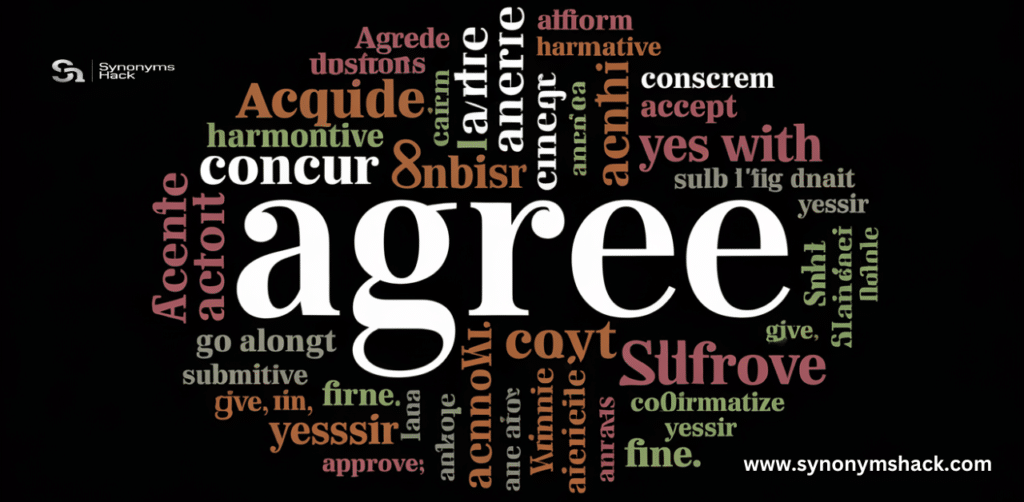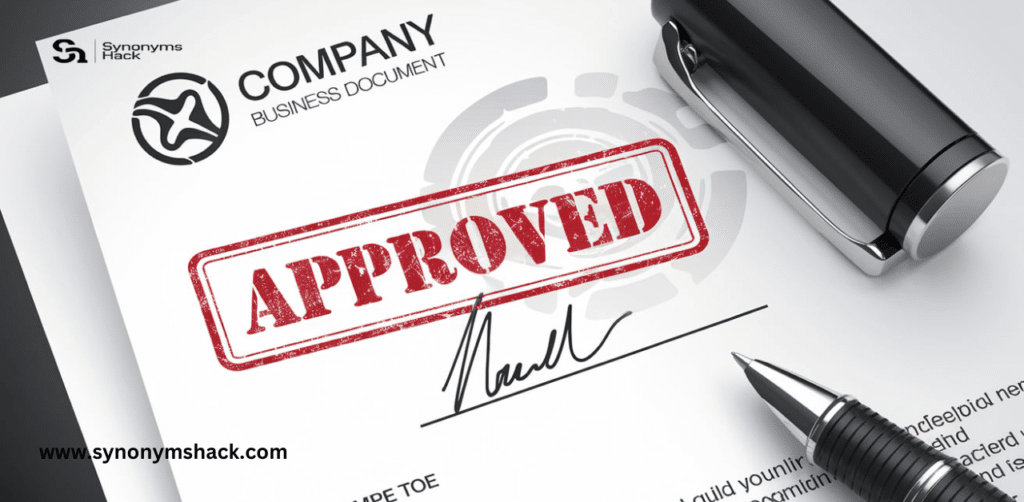Ever found yourself nodding along in a meeting, “I Agree with You” Formally , but stuck with the same old phrase? You’re not alone. In the world of professional communication, finding fresh ways to say “I agree” can be a game-changer. It’s not just about variety; it’s about precision, nuance, and making your voice heard in a way that resonates.
Imagine you’re in a boardroom, surrounded by sharp minds and sharper suits. The discussion is heating up, and you’ve got something to add. But how do you do it without sounding like a broken record? That’s where mastering formal agreement statements comes in handy. It’s not just about agreement; it’s about articulating your support in a way that adds value to the conversation.
Is It Professionally Good to Use “I Agree with You “Formally?
Let’s face it: in business or professional settings, simply saying “I agree” can sometimes fall flat. While there’s nothing inherently wrong with the phrase, relying on it too heavily might make you sound less engaged or thoughtful than you actually are. The key to professional communication skill lies in your ability to express agreement in ways that demonstrate your active listening and critical thinking.
By expanding your repertoire of formal agreement phrases, you’re not just agreeing – you’re validating ideas, building rapport, and showcasing your linguistic finesse. It’s about striking that perfect balance between clarity and sophistication, making your agreement not just heard, but felt and appreciated.
Don’t miss it: Other Ways To Say “Happy Monday”
20 Sophisticated Ways to Express Agreement in Professional Settings

Now, let’s dive into twenty alternative formal ways to express your agreement, complete with examples that’ll help you nail these phrases in real-world scenarios.
- “I concur with your assessment.”
- “Your perspective is entirely valid.”
- “I’m in complete accord with your viewpoint.”
- “Your analysis is spot-on.”
- “I find your argument compelling.”
- “Your point resonates strongly with me.”
- “I’m in complete accordance with your view.”
- “Your perspective aligns perfectly with the data.”
- “I wholeheartedly endorse your proposal.”
- “Your insights are both valuable and timely.”
- “I’m convinced by the merit of your argument.”
- “Your position is well-reasoned and persuasive.”
- “I’m in full agreement with your assessment.”
- “Your logic is impeccable.”
- “I fully support your conclusion.”
- “Your argument is both sound and convincing.”
- “I’m entirely persuaded by your reasoning.”
- “Your analysis is thorough and accurate.”
- “I couldn’t agree more with your stance.”
- “Your point of view is exceptionally well-founded.”
You must read: Other Ways To Say “I Hope Everything is Going Well”
1. “I concur with your assessment.”
This phrase exudes confidence and professionalism. It’s perfect for situations where you want to express strong agreement while maintaining a formal tone.
Example in a Board Meeting
Board Chair: “Based on our quarterly results, I believe we should increase our investment in R&D.”
You: “I concur with your assessment. The data clearly supports the need for innovation to stay competitive in our market.”
Example in a Client Email
In an email response to a proposed marketing strategy, you might write:
“Dear Ms. Thompson,
I’ve reviewed the marketing strategy you’ve outlined, and I concur with your assessment of our target demographic. Your insights into the millennial market are particularly astute.
Best regards, Alex Chen”
2. “Your point is well-taken.”
This phrase acknowledges the validity of someone’s argument while maintaining a professional manner. It’s especially useful when you want to agree with part of what someone has said without necessarily endorsing everything.
Example in a Team Meeting
Colleague: “We need to overhaul our customer service process to improve response times.”
You: “Your point is well-taken, John. Improving response times should indeed be a priority as we revamp our customer service approach.”
Example in a Project Proposal Email
In response to a project proposal, you might write:
“Dear Dr. Martinez,
I’ve reviewed your proposal for the new research initiative. Your point about the need for interdisciplinary collaboration is well-taken. It aligns perfectly with our department’s goals for the upcoming year.
Regards, Emily Zhao”
3. “I share your perspective on this matter.”
This phrase demonstrates a deep alignment of thoughts and is perfect for formal emails, presentations, or discussions where you want to emphasize a shared viewpoint.
Example in an Executive Summary
“After careful analysis of the market trends, I share your perspective on the need for digital transformation. Our competitors’ recent moves only reinforce this stance.”
Example in a Partnership Negotiation
Potential Partner: “We believe a joint venture would be mutually beneficial for both our companies.”
You: “I share your perspective on this matter. A collaboration could indeed open up new markets for both of us.”
Read also: Other Ways To Say “I’m Proud Of You”
4. “Your argument is both sound and persuasive.”
This formal option not only expresses agreement but also compliments the other person’s reasoning skills. It’s a powerful way to validate someone’s point while showcasing your own analytical abilities.
Example in an Academic Peer Review
“Your argument regarding the impact of social media on political discourse is both sound and persuasive. The methodology you’ve employed effectively supports your conclusions.”
Example in a Legal Consultation
Client: “I believe we have strong grounds for appeal based on the new evidence.”
You: “Your argument is both sound and persuasive, Mrs. Johnson. The new evidence indeed strengthens our case significantly.”
5. “I endorse your position on this issue.”

This phrase is a step up from simply saying “I agree With You” Formally. It implies a stronger level of support and is particularly useful in formal emails or when you want to lend your authority to someone else’s stance.
Example in a Board Vote
Board Member: “I propose we allocate 15% of our budget to sustainability initiatives.”
You: “I endorse your position on this issue, Mark. Sustainability should indeed be a key focus for our organization moving forward.”
Example in a Policy Recommendation
In an email to a policy committee, you might write:
“Dear Policy Committee,
After thorough review, I endorse your position on the proposed data privacy policy. The measures outlined strike an excellent balance between user protection and operational feasibility.
Regards, Dr. Aisha Patel Research Lead”
6. “Your viewpoint aligns with my own.”
This phrase is an excellent way to express agreement while emphasizing the sophisticated nature of your own thought process. It suggests that you’ve independently reached the same conclusion.
Example in a Strategic Planning Session
CEO: “I believe we need to pivot towards a more service-oriented business model.”
You: “Your viewpoint aligns with my own, Lisa. I’ve been analyzing market trends, and a service-oriented approach does seem to be the way forward.”
Example in an Editorial Review
In an email response to a manuscript submission, you might write:
“Dear Dr. Hernandez,
I’ve completed my review of your manuscript on quantum computing applications. Your viewpoint on the potential impact on cryptography aligns with my own. Your analysis provides a fresh perspective on this crucial topic.
Best regards, Prof. James Wilson Editor-in-Chief Journal of Science”
7. “I find myself in accord with your statement.”
This formal synonym for agreement adds a touch of elegance to your speech or writing. It’s particularly effective in more formal or academic settings.
Example in a Diplomatic Exchange
Ambassador: “We propose a joint task force to address the environmental challenges in the region.”
You: “I find myself in accord with your statement, Ambassador Chen. A collaborative approach is indeed crucial for tackling these complex issues.”
Example in a Research Collaboration
In an email to a research partner, you might write:
“Dear Dr. Sato,
After our recent discussion on the potential applications of CRISPR technology, I find myself in accord with your statement regarding the ethical considerations we must address. Your proposed framework for ethical review is particularly insightful.
Looking forward to our collaboration, Prof. Elena Rodriguez Principal Investigator Institute of Genetic Research”
You should read: Other Ways To Say “Keep Up The Good Work”
8. “Your reasoning is impeccable.”
This phrase goes beyond simple agreement to validate the other person’s thought process. It’s a powerful way to show respect for someone’s intellectual abilities.
Example in a Legal Argument
Lawyer: “Based on the precedent set in Smith v. Jones, our client’s case for intellectual property infringement is strong.”
You: “Your reasoning is impeccable, counselor. The parallels between our case and Smith v. Jones are indeed striking.”
Example in a Scientific Peer Review
In a review of a scientific paper, you might write:
“Dear Dr. Nguyen,
I’ve completed my review of your paper “New Insights into Dark Matter Distribution in Galactic Halos.” Your reasoning regarding the implications of recent observational data is impeccable. Your analysis provides a compelling argument for revisiting our current models.
Sincerely, Dr. Fatima Al-Rashid Peer Reviewer Scientific Journal of Astrophysics”
9. “I’m of the same mind on this topic.”
This phrase suggests a deep intellectual alignment and is particularly useful when you want to emphasize shared thinking or values.
Example in a Political Debate
Panelist: “I believe we need to prioritize renewable energy investments to combat climate change.”
You: “I’m of the same mind on this topic, Senator. Renewable energy is indeed crucial for a sustainable future.”
Example in a Corporate Vision Meeting
In response to a draft of a company vision, you might write:
“Dear Rajesh,
After reviewing your draft of our Company Vision 2030, I’m of the same mind on this topic. Your emphasis on sustainable innovation and global collaboration resonates strongly with my own vision for our future.
Looking forward to presenting this to the board, Samantha Lee COO, InnovaTech”
10. “Your conclusion is well-supported by the evidence.”

This phrase not only expresses agreement but also acknowledges the solid foundation of the other person’s argument. It’s particularly useful in academic or analytical contexts.
Example in a Medical Research Presentation
Researcher: “Based on our clinical trials, the new drug shows significant promise in treating advanced-stage cancer.”
You: “Your conclusion is well-supported by the evidence, Dr. Patel. The remission rates in the trial group are indeed remarkable.”
Example in a Financial Audit Report
In an audit report to a board of directors, you might write:
“Dear Board Members,
After a comprehensive review of Corporation X’s financial statements and practices, I concur with the CFO’s assessment of the company’s financial health. Your conclusion regarding the need for increased investment in cybersecurity is well-supported by the evidence. The recent industry-wide breaches underscore the importance of this recommendation.
Sincerely, Michael O’Brien Lead Auditor Accounting Firm LLC”
11. “Your analysis is spot-on.”
This phrase combines professional communication with a touch of modern flair, making it versatile for various formal settings.
Example in a Market Research Presentation
Analyst: “Our data suggests that Gen Z consumers are more likely to prioritize sustainability in their purchasing decisions.”
You: “Your analysis is spot-on, Jessica. The correlation between age demographics and eco-conscious buying habits is indeed striking.”
Example in a Software Development Review
In an email to a development team lead, you might write:
“Dear Alex,
I’ve reviewed your proposal for implementing AI-driven user experience improvements. Your analysis of our current UX pain points is spot-on. The proposed solutions align perfectly with our goal of increasing user engagement.
Best regards, Samantha Chen UX Director”
12. “I find your argument compelling.”
This formal option for expressing agreement emphasizes the persuasive power of the other person’s reasoning.
Example in a Legal Brief
“Upon review of the plaintiff’s argument regarding intellectual property infringement, I find your argument compelling. The precedents cited provide strong support for our position.”
Example in an Academic Peer Review
For a scholarly article on climate change, you might write:
“Dear Dr. Thompson,
I’ve thoroughly reviewed your paper on the impact of ocean acidification on coral reefs. I find your argument compelling, particularly your analysis of long-term pH level changes and their correlation with reef degradation rates.
Sincerely, Prof. Maria Gonzalez Marine Biology Department”
Don’t miss it: Other Ways To Say “I’m Happy For You”
13. “Your point resonates strongly with me.”
This phrase suggests not just agreement, but a deep personal connection with the idea presented.
Example in a Corporate Ethics Meeting
HR Director: “We need to prioritize diversity and inclusion in our hiring practices.”
You: “Your point resonates strongly with me, David. Creating a more inclusive workplace is indeed crucial for our company’s growth and cultural health.”
Example in a Policy Review
In an email to a policy think tank, you might write:
“Dear Dr. Patel,
Your recent white paper on urban housing solutions has been enlightening. Your point about the need for mixed-income development resonates strongly with me. It aligns perfectly with the observed social benefits of diverse neighborhoods.
Best regards, Councilwoman Sarah Johnson”
14. “I’m in complete accordance with your view.”
This sophisticated phrase expresses full agreement and is particularly useful in formal emails or high-level discussions.
Example in an International Relations Forum
Diplomat: “We believe that multilateral cooperation is key to addressing global climate challenges.”
You: “I’m in complete accordance with your view, Ambassador Chen. Only through collaborative efforts can we hope to make meaningful progress on this critical issue.”
Example in a Corporate Merger Discussion
In a memo to the board of directors, you might write:
“Dear Board Members,
After careful consideration of the proposed merger with TechCorp, I’m in complete accordance with the CEO’s view on the potential synergies. The complementary nature of our technologies and market positions presents a unique opportunity for growth.
Respectfully, Jonathan Lee CFO, InnovaSoft Inc.”
15. “Your perspective aligns perfectly with the data.”

This phrase not only expresses agreement but also validates the other person’s viewpoint with empirical support.
Example in a Scientific Conference
Researcher: “Our findings suggest a strong correlation between sleep patterns and cognitive performance in adolescents.”
You: “Your perspective aligns perfectly with the data, Dr. Nakamura. The longitudinal studies you’ve presented provide robust support for your conclusions.”
Example in a Financial Forecast Meeting
In an email to the finance team, you might write:
“Team,
I’ve reviewed everyone’s projections for the next fiscal year. Mark’s perspective on the potential impact of emerging markets aligns perfectly with the data from our recent market penetration studies. His forecast provides a solid foundation for our strategic planning.
Best, Alexis Rodrigez Senior Financial Analyst”
16. “I wholeheartedly endorse your proposal.”
This phrase expresses strong, unequivocal support and is particularly effective in formal business communication.
Example in a Board Meeting
Board Member: “I propose we allocate 20% of our R&D budget to exploring sustainable energy solutions.”
You: “I wholeheartedly endorse your proposal, Amanda. Investing in sustainable technologies is crucial for our long-term viability and corporate responsibility.”
Example in a Grant Approval Process
In a letter of support for a research grant, you might write:
“Dear Grant Committee,
After thoroughly reviewing Dr. Sato’s research proposal on quantum computing applications in cryptography, I wholeheartedly endorse her proposal. The potential implications for data security are groundbreaking and align perfectly with our institution’s research priorities.
Sincerely, Prof. Alan Turing Head of Computer Science Department”
Read also: Other Ways To Say “Have A Safe Trip”
17. “Your insights are both valuable and timely.”
This phrase not only expresses agreement but also emphasizes the relevance and importance of the other person’s contribution.
Example in a Marketing Strategy Meeting
Marketing Manager: “We should pivot towards more personalized, data-driven marketing campaigns.”
You: “Your insights are both valuable and timely, Chris. With the recent changes in data privacy laws, a more targeted approach is indeed crucial.”
Example in a Technology Trend Analysis
In a response to a tech industry report, you might write:
“Dear Ms. Zuckerberg,
Your analysis of emerging trends in AI and machine learning is exceptional. Your insights into the potential applications of federated learning are both valuable and timely. They provide a crucial roadmap for navigating the evolving landscape of AI ethics and data privacy.
Best regards, Dr. Raj Patel Chief Innovation Officer, TechFuture Corp.”
18. “I’m convinced by the merit of your argument.”

This formal synonym for agreement emphasizes the logical strength of the other person’s position.
Example in a Legal Debate
Attorney: “Based on the precedent set in Brown v. Board of Education, our argument for equal access to educational resources is unassailable.”
You: “I’m convinced by the merit of your argument, counselor. The parallels between our case and the landmark decision are indeed compelling.”
19. “Your position is well-reasoned and persuasive.”
This phrase compliments both the logical structure and the convincing nature of the other person’s argument.
Example in a Policy Debate
Senator: “We must invest more in early childhood education to address long-term socioeconomic disparities.”
You: “Your position is well-reasoned and persuasive, Senator Johnson. The longitudinal studies you’ve cited clearly demonstrate the long-term benefits of early education interventions.”
20. “I’m in full agreement with your assessment.”

This straightforward yet formal option leaves no doubt about your position of agreement.
Example in a Environmental Impact Assessment
Environmental Scientist: “Based on our studies, the proposed development would have significant negative impacts on the local ecosystem.”
You: “I’m in full agreement with your assessment, Dr. Green. The potential damage to biodiversity and water quality is indeed alarming.”
Final Thoughts: “I Agree with You” Formally”
Mastering these additional formal agreement statements further enhances your ability to express concurrence in a sophisticated and impactful manner. By incorporating these phrases into your professional lexicon, you’re not just agreeing – you’re validating ideas, building stronger professional relationships, and demonstrating your critical thinking skills.
Remember, the key lies in choosing the right phrase for the right context. Whether you’re in a boardroom, crafting an email, or engaged in academic discourse, these sophisticated ways to express agreement can help you make a lasting impression.
As you continue to refine your communication skills, consider exploring additional resources on professional etiquette and business communication. The Harvard Business Review’s section on business communication offers valuable insights and strategies for effective professional interaction.
By expanding your repertoire of agreement phrases, you’re equipping yourself with the tools to navigate complex professional conversations with grace and precision. So, the next time you find yourself nodding in agreement, take a moment to choose your words carefully. Your thoughtful response might just be the catalyst for deeper, more productive discussions in your professional sphere.

Brad Hook is the insightful admin and writer who brings depth and clarity to the world of synonyms. With a talent for making words accessible and engaging, he inspires readers to expand their vocabulary and explore language’s nuances. Brad’s writing helps others communicate more effectively and creatively every day.








